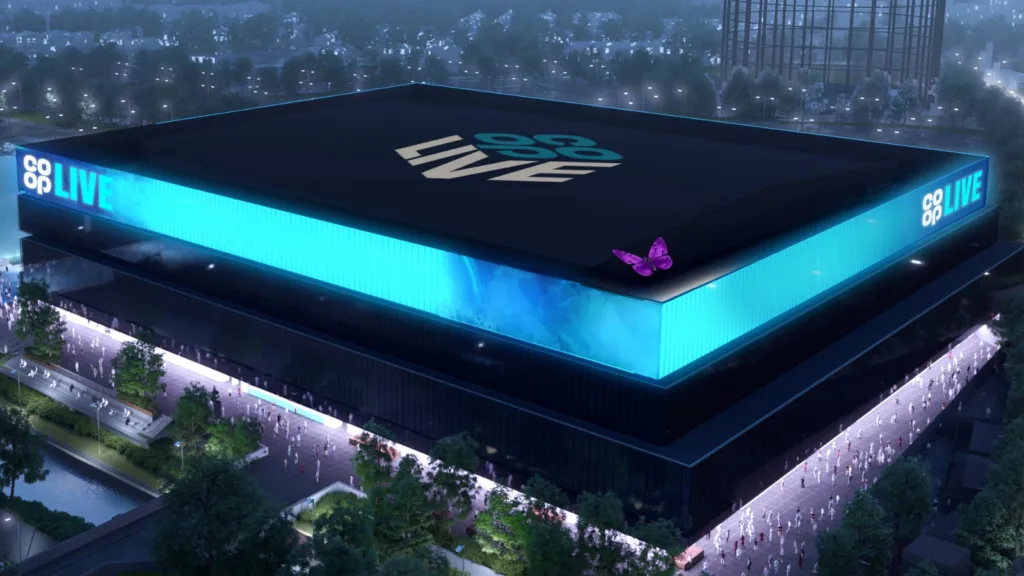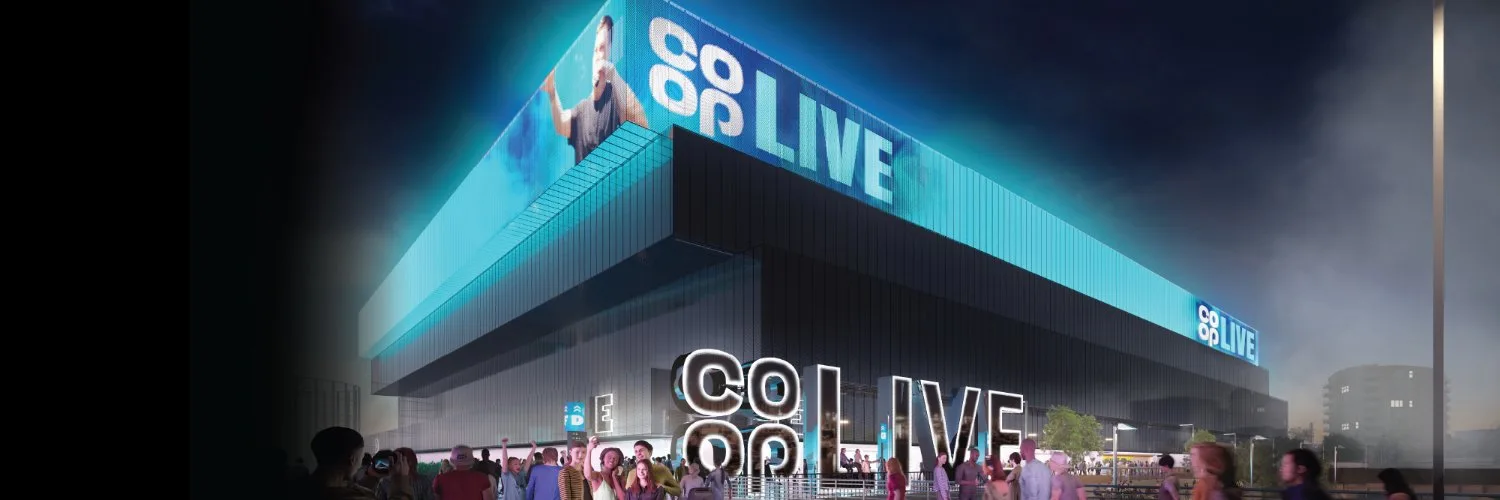
Featured image sourced from X (@TheCoopLive)
In today’s highly competitive market, naming rights have emerged as a pivotal marketing strategy for brands aiming to bolster visibility and strengthen their association with cultural or sporting landmarks.
Companies can enhance their brand image and gain extensive media exposure by aligning with venues that draw substantial public interest. This strategy is not just about brand visibility, but also about embedding the brand into the community and everyday conversations, creating a lasting bond with the audience.
One such ambitious project is Co-op Live in Manchester, designed to be a state-of-the-art entertainment venue.
Poised to host a variety of events, from concerts to cultural gatherings, it aims to position itself at the heart of Manchester’s entertainment scene.
However, its journey has been anything but smooth.
Scheduled to open in 2024, the venue has faced significant setbacks, primarily due to construction delays that have led to numerous event cancellations and rescheduling in April and May of the same year.
These issues present a complex challenge, not only in terms of project management but also in how they reflect on the Co-operative Group’s brand, which has invested heavily in the naming rights.
Here, we will explore the repercussions of these setbacks on the Co-operative Group’s brand image and evaluate the broader implications of such high-stake partnerships in the corporate world.
Background of Co-op Live
 Image sourced from Co-Op Live/X (@TheCoopLive)
Image sourced from Co-Op Live/X (@TheCoopLive)Co-op Live, located in the heart of Manchester, was touted as a major step forward for entertainment and cultural engagement.
With plans to host an array of events, including major concerts, sports, and community activities, the venue is designed to accommodate up to 23,500 guests, making it one of the largest indoor arena in the UK.
Its strategic placement near Manchester City’s Etihad Stadium is intended to leverage the area’s existing transport and hospitality infrastructure, thereby enhancing the visitor experience and boosting local economic activity.
The Co-operative Group, a name synonymous with community and ethical business practices, secured the naming rights to Co-op Live some time ago. This move was strategically aligned with the Group’s broader marketing objectives, aiming to strengthen its presence in the cultural sphere and deepen its connections within the community it serves.
By associating with a venue that promises to attract a wide demographic, the Co-operative Group intended to reinforce its brand ethos of cooperation and community support.
The partnership was announced with significant fanfare, reflecting mutual aspirations to transform Manchester’s cultural landscape. For the Co-operative Group, the investment in naming rights was not just a business decision but a commitment to cultural development and community enrichment.
This collaboration was expected to create a dynamic synergy between the brand’s identity and the venue’s cultural agenda, thereby enhancing the Co-operative Group’s visibility and resonance with a broader audience.
However, recent unfolding events stretching April and May 2024 have posed unexpected challenges to this vision, bringing to the fore the complexities and risks inherent in such large-scale partnerships.
As we will continue, we’ll highlight how the delays and cancellations at Co-op Live have disrupted event scheduling and also the ripple effects on the Co-operative Group’s brand perception and trust among its stakeholders.
Timeline of the April-May 2024 Issues
The timeline of events at Co-op Live in April and May 2024 has been marked by multiple delays and postponements, affecting several high-profile events and leading to significant public disappointment and logistical challenges.
Late April 2024: It became evident that Co-op Live would not be ready in time for its scheduled opening. Issues with venue readiness, including incomplete installations of critical systems such as emergency communications, led to the postponement of the opening and all early April events.
Peter Kay’s shows, planned to be the curtain raiser and were among the most anticipated at the venue, were rescheduled twice, once to the end of April, then a second time to the end of May. Co-op Live’s management continued extensive testing of venue systems to avoid further disappointments.
The venue faced further delays as it continued testing and preparing critical systems. This led to additional rescheduling, including a concert by The Black Keys originally set for late April, which was also moved to mid-May.
May 2024: Delays continued as Co-op Live struggled with technical issues. A Boogie Wit Da Hoodie saw their gig cancelled extremely last minute, despite fans having begun to be let in, the postponement saw flyers handed out to arrivals outside.
Subsequently, further high-profile performances, including Olivia Rodrigo’s concerts scheduled for early May, were postponed due to the ongoing venue-related technical problems.
The latest announcement saw the homecoming five-night residency by Take That shift across Manchester to the AO Arena in good time to allow the shows to take place and limit disappointment to fans, in a move that also saw investors and stakeholders forced to make a clear statement on the back of such news.
Personally think you should reimburse travel and accommodation as well. There will be countless people who would’ve booked travel and hotels just for you to stitch them up because you couldn’t meet assured deadlines.
— Ant (@CityBIue) May 2, 2024
The frequent rescheduling and delays have significantly impacted the public’s perception of Co-op Live, causing frustration and dissatisfaction among ticket holders and fans. The repeated issues have underscored the challenges of opening a major entertainment venue and maintaining stakeholder trust in the face of such high-profile setbacks.
Detailed Analysis of Brand Impact
The ongoing issues at Co-op Live could have a profound and multifaceted impact on the Co-operative Group’s brand image, challenging its reputation for reliability and community focus.
The repercussions of the venue’s repeated delays extend beyond mere logistical frustrations, touching on deeper aspects of brand trust and consumer loyalty.
Immediate Brand Image Damage
The Co-operative Group, known for its emphasis on community and ethical values, has faced significant backlash due to the disruptions at Co-op Live.
The brand’s association with a project marred by repeated delays and poor communication has led to a perception of mismanagement and unreliability.
This is particularly damaging given the Co-operative Group’s brand ethos, which strongly emphasises trust and customer satisfaction.
Social media reactions and customer feedback have highlighted a sense of betrayal among loyal customers, with many expressing their disappointment in the cooperative’s handling of the situation.
It’s awful isn’t it. Totally trashed the Co-op brand & it’s an embarrassment for Manchester. That criticism they had about grassroots venues hasn’t aged well either.
— Mike (@MikAlexH) May 2, 2024
Long-term Brand Trust Erosion
The long-term impact on the Co-operative Group’s brand could be even more detrimental. Brand trust is built on consistency and reliability, both of which have been undermined by the ongoing issues at Co-op Live.
Consumer trust, once lost, is challenging to regain, and the Co-operative Group will need to undertake significant efforts to rebuild its standing among stakeholders. This erosion of trust can lead to a decrease in consumer loyalty and potentially affect other business areas, from grocery sales to financial services, as the cooperative’s brand perception suffers.
Comparative Analysis with Industry Benchmarks
Looking at similar instances, such as the technical failures at the Fyre Festival, which severely damaged the reputation of the associated brands, it’s clear that the implications of such events can be long-lasting.
In those cases, recovery involved extensive public relations campaigns and a strategic overhaul of brand management practices. The Co-operative Group may need to consider similar measures to address the current crisis effectively.
Stakeholder and Investor Confidence
Investors and business partners may also reconsider their association with the Co-operative Group due to the risks exposed by the Co-op Live issues.
This could lead to challenges in securing future partnerships and investments, especially in projects that require significant upfront capital and carry substantial operational risks.
Opportunities for Recovery
On a more positive note, this situation also presents an opportunity for the Co-operative Group to demonstrate its commitment to transparency and customer service.
Effective crisis management, including clear communication and tangible steps to resolve the issues, could mitigate some of the negative impacts. Additionally, a robust review of project management and operational procedures could prevent similar issues in future ventures.
While the Co-op Live fiasco has posed significant challenges to the Co-operative Group’s brand image, it also offers a crucial learning opportunity. How the Group addresses these challenges will be pivotal in determining the speed and effectiveness of its recovery in public perception.
Comparative Case Studies
The challenges faced by Co-op Live in Manchester are not unique when dealing with naming rights and brand associations. By examining two other cases where brands faced significant negative publicity due to issues with their associated events or properties, we can gain insights into potential recovery strategies and long-term impacts.
Enron Field (now Minute Maid Park)
The Houston Astros’ stadium was originally named Enron Field in 2000, following a $100 million naming rights agreement.
However, the Enron scandal in 2001, which involved one of the largest corporate frauds in history, severely tarnished the brand.
The association with such a negative event caused significant public relations challenges for the baseball team and the venue.
The Astros promptly dissociated from Enron by buying back the naming rights for $2.1 million and renaming the stadium.
This case highlights the risks involved in naming rights when the associated brand faces major ethical or legal issues.
The Fyre Festival
The Fyre Festival in 2017 became infamously associated with fraud and mismanagement, garnering widespread negative media attention.
Brands associated with the festival, including the influencers who promoted it, faced backlash and reputational damage.
The festival’s failure underlined the importance of due diligence and the potential PR disaster that can occur when an event fails to meet public expectations dramatically.
Recovery for many associated brands involved distancing themselves from the event, and issuing public apologies, and some, like influencers, faced legal actions for their promotional roles.
Analysis of Recovery Strategies
- Quick Response: In the case of the Astros, the quick decision to rebrand the stadium was crucial in distancing themselves from the Enron scandal.
- Transparency and Accountability: Post-Fyre Festival, brands and influencers had to be transparent about their involvement and take accountability to restore trust.
- Strategic Rebranding: Both cases required a form of rebranding or repositioning to navigate out of the negative spotlight.
These case studies illustrate that while the immediate impact of negative associations can be severe, thoughtful and decisive action can mitigate long-term damage.
For Co-op Live and the Co-operative Group, learning from these examples could guide their recovery strategy, focusing on transparency, customer engagement, and possibly reevaluating partnership strategies to prevent future issues.
Strategic Recommendations for Crisis Management
For Co-op Live and the Co-operative Group, the unfolding crisis around the venue’s opening delays offers critical lessons in managing public relations disasters effectively. Based on industry best practices and the lessons drawn from similar crises, here are several strategic recommendations aimed at navigating the situation and restoring public confidence:
1. Transparent and Frequent Communication
One of the first steps in crisis management is to communicate openly with all stakeholders involved, including customers, partners, and the media. Co-op Live should provide regular updates about the situation, including what is causing the delays, what is being done to address them, and realistic timelines for resolution. Transparent communication can help mitigate frustration and build trust, even in adverse circumstances.
2. Customer-Centric Solutions
It is essential to address the inconvenience caused to ticket holders and event organisers promptly. This could include offering refunds, rescheduling events with added benefits, or providing alternative compensation that adds value, such as discounts on future tickets or exclusive access to other events. These gestures show that the organisation values its customers and is committed to maintaining positive relationships.
3. Engage in Proactive Public Relations
To counteract the negative publicity, Co-op Live could launch a public relations campaign highlighting the venue’s future benefits to the community, its economic impact, and its state-of-the-art facilities. Featuring positive testimonials from partners and community leaders can also help improve public perception.
4. Review and Strengthen Operational Protocols
Learning from this incident, Co-op Live should review its project management and operational protocols to identify and rectify gaps that led to the delays. Implementing stronger oversight mechanisms and perhaps bringing in external consultants to audit processes can prevent similar issues in the future.
5. Host Community Engagement Events
Once the venue is operational, organising community engagement events, such as open days, free concerts, or community meetings, can help rebuild local trust and goodwill. These events can serve as a platform to demonstrate the venue’s capabilities and directly engage with the local populace, fostering a sense of ownership and pride in the project.
6. Monitor and Adapt
The Co-operative Group should continuously monitor public sentiment and the effectiveness of its crisis management strategies. Being adaptable and ready to change tactics in response to stakeholder feedback is crucial in managing an ongoing crisis effectively.
By implementing these strategies, Co-op Live and the Co-operative Group can work towards mitigating the current crisis’s negative impacts and laying a stronger foundation for future operations. Such proactive and thoughtful handling of the situation could not only restore but potentially enhance their reputation in the long term.
Review and Analysis of Investor Statements on Co-op Live Delays
The recent challenges at Co-op Live have prompted official statements from both Oak View Group, the main investor responsible for the venue’s construction, and the Co-operative Group, the naming rights partner. These statements are crucial for understanding the responses to the disruptions and the strategies being proposed to address the concerns of stakeholders and the public.
Statement Summary from Oak View Group
Tim Leiweke, Chairman and CEO of Oak View Group, acknowledged the rough start and the significant inconvenience caused by the delays. He extended a sincere apology to all affected parties, emphasising the organization’s commitment to rectifying the situation and rebuilding trust.
Leiweke notes the importance of addressing the impact on ticket holders, which will be detailed in forthcoming communications. He assured that the venue is working diligently to resolve the issues and looks forward to the reopening, scheduled for 14th May 2024.
The main telling point will be if this will be a fully achievable goal to avoid any further embarrassment.
Co-operative Group’s Role and Response
The Co-operative Group, as the naming rights partner, has expressed concern over the impact on ticket holders and the overall customer experience. The organisation is involved in discussions to ensure that the repercussions of the delays are mitigated as much as possible.
The Co-operative Group is likely focusing on maintaining its brand values of community trust and support, even amidst these challenging circumstances.
Analysis and Implications
The statements from both Oak View Group and the Co-operative Group highlight a proactive approach to crisis management, focusing on transparency and customer compensation. This is essential to mitigate the negative effects on their reputations. The commitment to safety and thorough review before reopening suggests a focus on long-term quality and reliability, which could help in recovering trust and credibility.
Furthermore, these communications indicate a coordinated effort between the venue’s management and its naming rights partner to ensure a unified front in addressing the public’s concerns. This collaboration is crucial for maintaining cohesive and effective communication strategies.
The upcoming steps, as detailed in these statements, will be pivotal in determining how effectively Co-op Live and the Co-operative Group can manage the fallout from the venue’s problematic launch. The focus on direct communication with ticket holders and the promise of specific details about compensations are positive moves that may help stabilise the situation and begin the process of rebuilding the damaged trust.
Conclusion
The unfolding events at Co-op Live in Manchester provide a textbook case of the complexities involved in managing brand impact during crises.
The disruptions and subsequent handling of the situation by Oak View Group and the Co-operative Group underscore the critical importance of maintaining a coherent and responsive brand voice during unforeseen challenges.
This situation highlights how vital it is for brands to communicate effectively, manage stakeholder expectations, and swiftly address any fallout to mitigate damage to their reputation.
In such scenarios, services like those offered by Fly High Media become invaluable. Understanding and maintaining a consistent brand voice across all platforms is crucial, particularly in digital marketing contexts including PPC, SEO, social media, and email communications. Fly High Media can assist businesses in navigating these challenges by providing tailored strategies that enhance visibility and engagement, even during crises.
Our expertise in digital marketing ensures that a brand’s message remains clear and effective, reinforcing trust and loyalty among consumers.
Effective crisis management coupled with strategic digital marketing can not only help in managing the immediate repercussions of a crisis but also in strengthening a brand’s market position for the future.
Fly High Media plays a pivotal role in these efforts, offering the tools and expertise necessary to turn challenges into opportunities for brand growth and reinforcement.
The case of Co-op Live serves as a reminder of the delicate balance brands must maintain and the proactive measures they must undertake to safeguard and enhance their reputation in the digital age. With the right support and strategies, businesses can navigate even the most challenging circumstances, maintaining brand integrity and customer trust.
Contact Us
Cheshire (Head Office)
Manchester
Get in touch
Let’s find the best solution for your business



